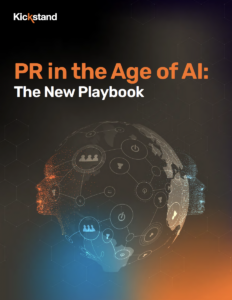
by Molly George
Let’s be honest: search isn’t what it used to be.
Once upon a time, if you wanted to get found online, SEO was the name of the game. Keywords, hyperlinks, and page rankings were the holy trinity of visibility. But that playbook is changing, and fast.
Today, people aren’t scrolling through pages and pages of Google results. They’re checking Google’s AI Overview. They’re asking questions on ChatGPT. They’re talking to AI assistants like Microsoft Copilot. And rather than serving up a list of links, these tools are scanning the web, summarizing answers, and choosing what information gets surfaced in the response.
That means your brand’s visibility is no longer determined by how findable you are. It’s about how recommendable you are.
AI search = fewer clicks, more context
We’re entering an era of what we call “zero-click discovery.” Instead of typing a question, skimming the top 10 results, and clicking a few links, users can now get direct answers pulled from what AI deems the most relevant and trustworthy sources.
This has huge implications for how PR professionals think about brand awareness. If a potential customer asks an AI assistant, “What’s the best software for remote team collaboration?”, will your company show up in the answer? Does the assistant even know enough about you to recommend you?
Only if it believes your brand is trustworthy. And it needs to have enough high-quality, well-documented content to do so.
From SEO to “AI visibility”
Ranking high on Google results is no longer enough. Today, brands need to create the kind of content that helps train AI models to understand who you are, what you do, and why you matter.
That means shifting your strategy from traditional SEO to AI visibility.
A few key elements of this shift:
- Answer-oriented content: Instead of just stuffing pages with keywords, focus on addressing questions your audience is asking. What common problems does your ICP need to solve? How can you ensure your company’s answers to those FAQs will surface when they type queries into ChatGPT?
- Credible documentation: Make sure your product, leadership team, awards, and case studies are documented across the entire web – not just on your website. Think about your strategy holistically: social media, Substacks, podcasts, and other non-traditional media opportunities will be your friend here.
- Third-party validation: Authority still matters, and AI models heavily favor sources that are widely cited and deemed trustworthy. That means earned media, analyst coverage, and high-authority backlinks matter more than ever.
In other words, your digital footprint needs to be rich, not just optimized.
PR’s role just got a lot bigger
If all of this sounds intimidating, here’s the good news: PR is perfectly positioned to help brands navigate this new era. We’ve always been the storytellers, the message shapers, the influence builders. Now, we just need to make sure our stories are getting picked up – by reporters and by AI.
AI-powered search isn’t the end of PR as we know it. It’s an invitation to evolve. By reimagining our scope of influence and laying the foundation for a strong knowledge landscape, your brand can show up consistently across the platforms and channels that matter most.
Want the full strategy?
We’re only scratching the surface of how AI is transforming the role of PR. In our latest eBook, PR in the Age of AI, we break down what’s changing, why it matters, and how to build a modern strategy to stay ahead of the curve.




